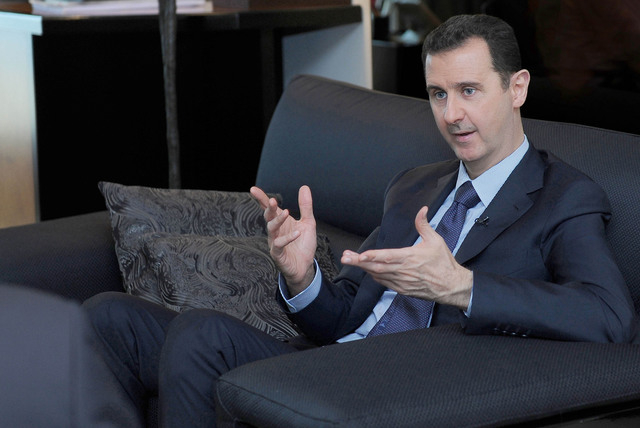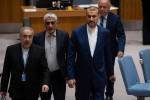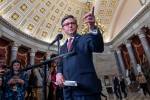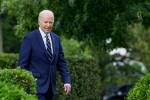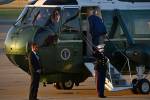Consensus, then about-face from Obama on Syria
WASHINGTON — Short on support at home and allies abroad, President Barack Obama unexpectedly stepped back from a missile attack against Syria and instead asked Congress on Saturday to support a strike punishing Bashar Assad’s regime for using chemical weapons.
With Navy ships on standby in the Mediterranean Sea ready to launch their cruise missiles, Obama said he had decided the United States should take military action and that he believes that as commander in chief, he has “the authority to carry out this military action without specific congressional authorization.”
At the same time, he said, “I know that the country will be stronger if we take this course and our actions will be even more effective.”
Members of Congress began grappling with Obama’s plan to punish Syria, and lawmakers were seeking more information about the possible consequences of striking a region without knowing what would happen next.
The debate over what action Congress might approve was in its infancy as lawmakers prepare for hearings next week before the Senate Foreign Relations Committee. The first contours of the debate began emerging within hours of Obama’s announcement.
Sen. Harry Reid came out in favor of a military strike, saying it is “both justified and necessary.”
“I believe the United States has a moral obligation as well as a national security interest in defending innocent lives against such atrocities, and in enforcing international norms such as the prohibition against the use of chemical weapons,” said Reid, D-Nev.
Assad “must be held accountable for his heinous acts and the world looks to us for leadership,” Reid said.
Reid had remained silent the past week as Obama and Secretary of State John Kerry have built a case for the U.S. to attack. The senior Nevadan in Congress made his position clear in a statement in which he also announced the Senate will have public hearings and briefings in advance of a vote during the week on whether to authorize Obama to move forward.
“Given the atrocities committed by Bashar al-Assad against his own people, including the use of internationally prohibited chemical weapons and the murder of innocent children, it is time for Congress to debate and vote on whether Syria’s heinous actions should be met with a limited use of American military force,” Reid said. “The decision to take military action is not one to be taken lightly, and this decision will receive the full and open debate it deserves.”
Obama sent a formal request to Capitol Hill. U.S. warships are poised in the Mediterranean Sea and prepared to carry out the order to launch missiles on selected targets.
Among other Nevadans in Congress, Republican Rep. Joe Heck said on Thursday that the administration had yet to persuade him that military action was necessary or that there were “clearly defined goals and objectives” to the planned strike.
Other lawmakers — Republican Sen. Dean Heller and Rep. Mark Amodei and Democrat Reps. Steven Horsford and Dina Titus — have not indicated whether they would vote for or against U.S. military involvement, but all called on Obama to confer with Congress before cementing a course of action.
Obama’s remarks were televised live in the United States as well as on Syrian state television with translation.
Congress is scheduled to return from a summer vacation on Sept. 9, and in anticipation of the coming debate, Obama challenged lawmakers to consider “what message will we send if a dictator can gas hundreds of children to death in plain sight and pay no price.”
The president didn’t say so, but his strategy carries enormous risks to his and the nation’s credibility, which the administration has argued forcefully is on the line in Syria. Obama long ago said the use of chemical weapons was a “red line” that Assad would not be allowed to cross with impunity.
Nor would the White House say what options would still be open to the president if he fails to win the backing of the House and Senate for the military measures he has threatened.
Only this past week, British Prime Minister David Cameron suffered a humiliating defeat when the House of Commons refused to support his call for military action against Syria.
Halfway around the world, Syrians awoke to state television broadcasts of tanks, planes and other weapons of war, and troops training, all to a soundtrack of martial music. Assad’s government blames rebels in the Aug. 21 attack and has threatened retaliation if attacked.
Russian President Vladimir Putin, saying he was appealing to a Nobel Peace laureate rather than to a president, urged Obama to reconsider. A group that monitors casualties in the long Syrian civil war challenged the United States to substantiate its claim that 1,429 died in a chemical weapons attack, including more than 400 children.
By accident or design, the new timetable gives time for U.N. inspectors to receive lab results from the samples they took during four days in Damascus and to compile a final report. After leaving Syria overnight, the inspection team arrived in Rotterdam a few hours before Obama spoke. The group’s leader was expected to brief Secretary-General Ban Ki-moon today.
Administration officials said Obama was set on ordering a strike until Friday evening.
After a long walk around the White House grounds with Chief of Staff Denis McDonough, the president told his aide he had changed his mind.
The officials said Obama initially drew opposition in a two-hour session attended by Vice President Joe Biden, Defense Secretary Chuck Hagel, Director of National Intelligence James Klapper, CIA Director John Brennan, national security adviser Susan Rice and homeland security adviser Lisa Monaco. They declined to say which of the participants had argued against Obama’s proposal.
Whatever Congress decides, the developments marked a stunning turn.
France is Obama’s only major foreign ally supporting a strike. Polling shows support is lukewarm in the United States, and dozens of lawmakers in both parties have signed a letter urging Obama not to act without their backing. Outside the gates of the White House, the chants of protesters could be heard as the president stepped to a podium in the Rose Garden.
Had he gone ahead with a military strike, Obama would have become the first U.S. leader in three decades to attack a foreign nation without mustering broad international support or acting in direct defense of Americans. Not since 1983, when President Ronald Reagan ordered an invasion of the Caribbean island of Grenada, has the U.S. been so alone in pursuing major military action.
Republicans generally expressed satisfaction at Obama’s decision to seek congressional support and challenged him to make his case to the public and lawmakers that U.S. power should be used to punish Assad.
Steve Tetreault of the Stephens Washington Bureau contributed to this report.






